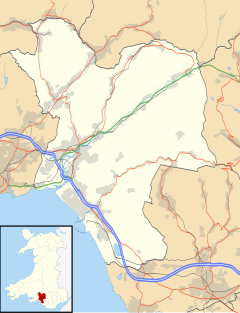Banwen
| Banwen | |
|---|---|
 Banwen Banwen shown within Neath Port Talbot | |
| OS grid reference | SN855095 |
| Principal area |
|
| Ceremonial county |
|
| Country | Wales |
| Sovereign state | United Kingdom |
| Post town | NEATH |
| Postcode district | SA10 |
| Dialling code | 01639 |
| Police | South Wales |
| Fire | Mid and West Wales |
| Ambulance | Welsh |
| EU Parliament | Wales |
| UK Parliament |
|
Banwen is a small village in Neath Port Talbot county borough in Wales. Banwen is part of the community of Onllwyn along with the village of Onllwyn itself and the adjacent parish of Dyffryn Cellwen. Banwen is in the Upper Dulais Valley, with views over the southern slopes of the Brecon Beacons.
Contents
1 Toponymy
2 History
2.1 Saint Patrick
3 Sport and leisure
4 Media
5 External links
6 References
Toponymy
The name Banwen clearly derives from the elements Ban and Wen meaning "height" or "summit" and "blessed" or "white" respectively. The name occurs frequently throughout the area. (as the name of a class of fields in Brynlloi, an open common Brynamman and a farm Cwmgrenig) suggesting an ancient continuity.
History
Copper, iron ore and tin were all mined from ancient times, and the settlement became an important station on the Neath-Brecon section of the Sarn Helen along the Pyrddin valley. During the Roman occupation, a fort named Ricus was established on the valley floor along with a very large Roman marching camp nearby.[1]
Saint Patrick
The village is notable for the local tradition that it was the birthplace of Saint Patrick. This is supported by the writings most widely attributed to him, The Confession of St, Patrick, in which the saint gives his birthplace as Banavem Taburniae or Banna Venta Berniae on the west coast of Britain.[2] Both names are possible Latin cognates for the Celtic name Banwen.
Eoin MacNeill argued that this was more likely than other purported birth places in Northern Britannia, as "The western coasts of southern Scotland and northern England held little to interest a (Irish) raider seeking quick access to booty and numerous slaves, while the southern coast of Wales offered both. In addition, the region was home to Uí Liatháin and possibly also Déisi settlers during this time". MacNeill also stated the etymology of the village made it the prime contender, but acknowledged the possibility of a transcription error.[3] Banwen was also stated to be Patrick's probable place of birth in Life of St. Patrick and His Place in History by Professor J. B. Bury.
The tradition is often given with another tradition that Patrick studied at Llantwit Major before the eponymous St Illtud established his college. An annual service is held on the Saint’s day at the Maen Padrig Sant (St Patrick's Stone), a memorial stone raised in 2004 alongside the Sarn Helen.
Sport and leisure
Banwen is home to rugby union club Banwen RFC formed in 1947.
Stages of the Wales Rally GB are held at Walters Arena.
The Banwen Miners Hunt was founded in the village in 1962 following the demise of the West Glamorgan hunt.[4] In the early days of the Hunt, the Duchess of Beaufort rode amongst the Banwen Miners.[5]
Media
Roman Road in Banwen is featured prominently as a location in The Strike, filmed in 1987 for the Channel 4 series The Comic Strip Presents... and broadcast in January 1988.
External links
- Cwmdulais Historical Society
- www.geograph.co.uk : photos of Banwen and surrounding area
References
^ "Banwen: Saint Patrick's Birthplace". Ireland, Wales and Europe Poems, History and Language..mw-parser-output cite.citation{font-style:inherit}.mw-parser-output q{quotes:"""""""'""'"}.mw-parser-output code.cs1-code{color:inherit;background:inherit;border:inherit;padding:inherit}.mw-parser-output .cs1-lock-free a{background:url("//upload.wikimedia.org/wikipedia/commons/thumb/6/65/Lock-green.svg/9px-Lock-green.svg.png")no-repeat;background-position:right .1em center}.mw-parser-output .cs1-lock-limited a,.mw-parser-output .cs1-lock-registration a{background:url("//upload.wikimedia.org/wikipedia/commons/thumb/d/d6/Lock-gray-alt-2.svg/9px-Lock-gray-alt-2.svg.png")no-repeat;background-position:right .1em center}.mw-parser-output .cs1-lock-subscription a{background:url("//upload.wikimedia.org/wikipedia/commons/thumb/a/aa/Lock-red-alt-2.svg/9px-Lock-red-alt-2.svg.png")no-repeat;background-position:right .1em center}.mw-parser-output .cs1-subscription,.mw-parser-output .cs1-registration{color:#555}.mw-parser-output .cs1-subscription span,.mw-parser-output .cs1-registration span{border-bottom:1px dotted;cursor:help}.mw-parser-output .cs1-hidden-error{display:none;font-size:100%}.mw-parser-output .cs1-visible-error{font-size:100%}.mw-parser-output .cs1-subscription,.mw-parser-output .cs1-registration,.mw-parser-output .cs1-format{font-size:95%}.mw-parser-output .cs1-kern-left,.mw-parser-output .cs1-kern-wl-left{padding-left:0.2em}.mw-parser-output .cs1-kern-right,.mw-parser-output .cs1-kern-wl-right{padding-right:0.2em}
^ Turner, J.H. (8 January 1872). "X.—An Inquiry as to the Birthplace of St. Patrick" (PDF). Archaeologia Scotica: Transactions of the Society of Antiquaries of Scotland. 5: 268.
^ Ballinger, Lucy. "Was St Patrick, patron saint of Ireland, a Welshman?". BBC News.
^ Banwen Miners Hunt Archived September 17, 2010, at the Wayback Machine.
^ The Welsh Academy Encyclopaedia of Wales. John Davies, Nigel Jenkins, Menna Baines and Peredur Lynch (2008) pg631
ISBN 978-0-7083-1953-6